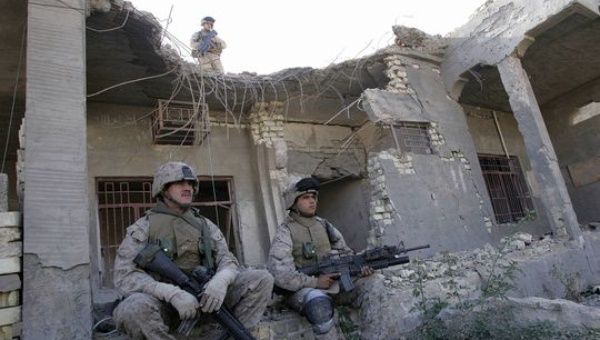Published 22 October 2014
An open letter to the UN Secretary General of the United Nations, Mr. Ban Ki Moon
Dear Mr. Ban Ki-Moon,
In April and November 2004 - ten years ago - US-led coalition forces attacked the Iraqi city Fallujah. Independent journalists and relief workers who were present in Fallujah in April 2004 reported how US Marines targeted civilians and blocked the hospital entrance preventing civilians from getting medical treatment.
A conservative estimate by the British organisation Iraq Body Count suggests that during the April attack about 600 civilians “with over 300 of these being women and children” were killed in Fallujah.
At the outset of the second attack, in November 2004, the conflict could have been settled peacefully. After receiving a request from a Fallujah-city-delegation, Mr. Kofi Annan, at the time Secretary General of the UN, had called for a dialog between US forces and the Fallujah resistance. However, no peaceful solution to the crisis was agreed that way.
On 8 November 2004, US coalition forces conducted a full scale military attack on Fallujah. About 4,000 resistance fighters were expected to hide in the city. The American military used tanks, jets, helicopters, gunships, artillery and various forms of heavy explosives during the course of which Fallujah was largely treated as a “free-fire zone”. Due to the sealing of the city, about 50,000 civilians were trapped in a densely populated area with the size of about 3 x 3.5 square kilometres. Consequently, about 90% of the city was destroyed and between 4,000-6,000 civilians were killed. Also in November 2004, US forces jailed more than 2,000 civilians and “insurgents” from Fallujah without trial.
In his book Fallujah: Eyewitness Testimony from Iraq’s Besieged City, the English writer Jonathan Holmes documented extensive evidence for possible violations of the Geneva Conventions of 1949, in particular the 4th Geneva Convention on the protection of civilians, as well as their relevant Additional Protocols from 1977. According to Holmes “the siege of Fallujah...contravened seventy individual articles of the Geneva Convention”. These include, for example the use of phosphor as an incendiary weapon, the use of cluster bombs, thermobaric weapons and other heavy explosive weaponry in residential areas, the direct targeting of civilians and wounded combatants, the raid of a hospital, the harassment of doctors, hospital staff and patients, the prevention of civilians from leaving the city and the prevention of relief organisations from entering the city.
Louise Arbour, at that time the United Nations High Commissioner for Human Rights, had vowed through her spokesperson to investigate “all violations of international humanitarian law and human rights law“ in Fallujah. But these issues have largely been ignored by Western powers, most notably the USA, UK and European Union, and their mass media. As yet there has not been an investigation by the UN or an independent body.
Today, the use of phosphor and depleted uranium ammunition has caused widespread deformities and diseases among infants in Fallujah. Iraqi NGOs (MHRI and CCERF) found out in 2006 that there were 5928 cases of children with unknown deformities and cancer in Fallujah.
On 24 July 2010 Patrick Cockburn reported in the British newspaper The Independent that a new study documented "dramatic increases in infant mortality, cancer and leukaemia in the Iraqi city of Fallujah” exceeding “those reported by survivors of the atomic bombs that were dropped on Hiroshima and Nagasaki in 1945”. For instance, the survey showed “a four-fold increase in all cancers and a 12-fold increase in childhood cancer in under-14s. Infant mortality in the city is more than four times higher than in neighbouring Jordan and eight times higher than in Kuwait”. Dr Chris Busby, visiting professor at the University of Ulster and co-author of the study presented by The Independent suggested that “to produce an effect like this, some very major mutagenic exposure must have occurred in 2004 when the attacks happened”.
Weren’t the people of Fallujah protected by the Geneva Conventions? Weren’t the US assaults on Fallujah carried out in violation of international law because the US, as the occupant of Iraq, had to adhere to the Geneva Conventions and protect Iraqi civilians? Couldn’t the destruction of Fallujah be regarded as a violation of the general prohibition of “wanton destruction of cities, towns, or villages, or devastation not justified by military necessity” which were already spelled out as war crimes in article 6(b) of the Nuremberg Principles and were affirmed as such by the UN General Assembly in 1950?
We, citizens, intellectuals, political activists, and defenders of human and democratic rights and liberties beseech the restoration of the UN Special Rapporteur on human rights in Iraq and to instigate an investigation with a view to:
1) Forming an international fact finding commission to examine US/Coalition actions in and around Fallujah in April and November 2004;
2) Facilitating the establishment of an independent international criminal tribunal for Iraq, or a referral to the International Criminal Court, to prosecute any persons responsible for grave violations of international humanitarian law in Fallujah and other localities in Iraq, as in the cases of Rwanda and the former Yugoslavia;
3) Pressuring the current US government to start a congressional inquiry;
4) Pressuring the current US and Iraqi governments to release all those detained in the course of the 2004 assaults, or to charge them before courts of law, as the case may be.

No comments:
Post a Comment